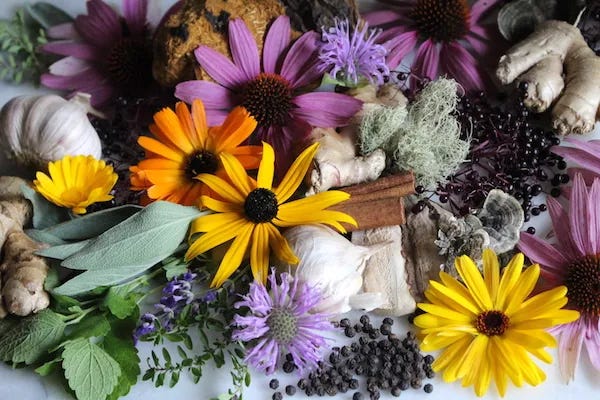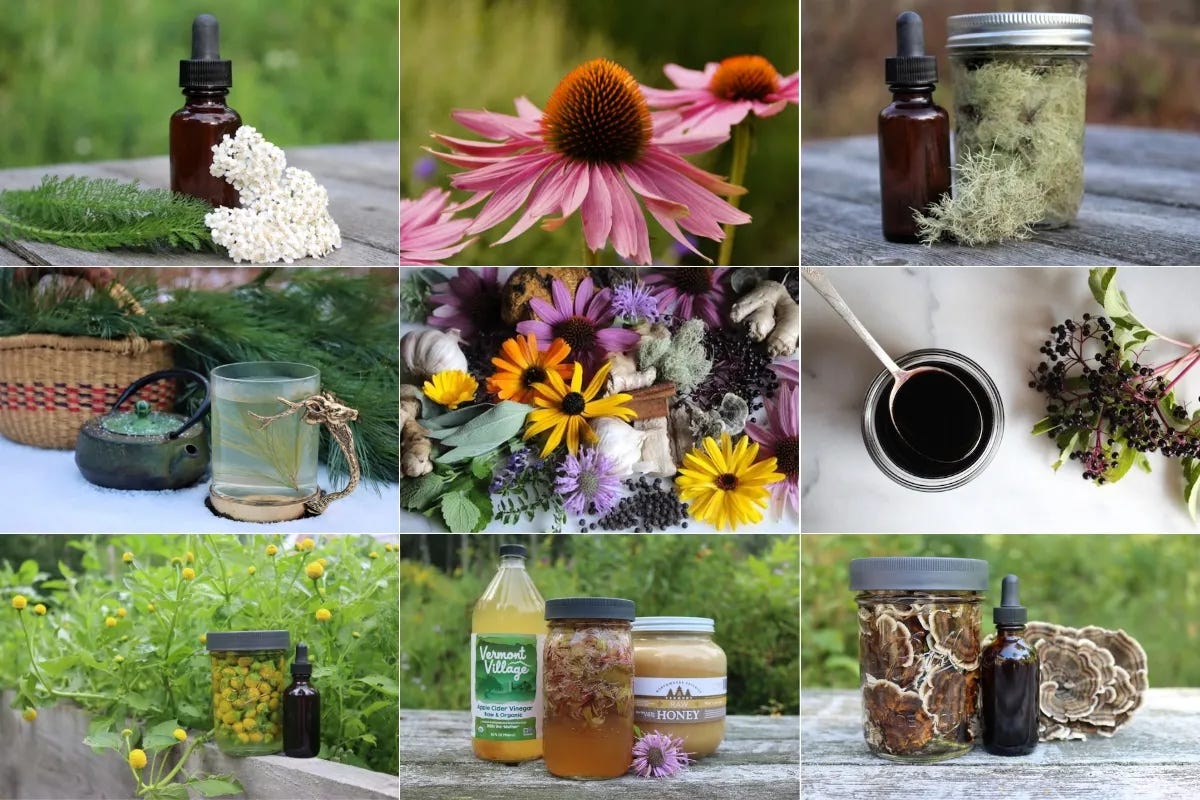Immune-boosting herbs are a big part of my family’s wellness routine, and for the last few years, we’ve needed all the help we can get with a doorknob-licking toddler and extra snuggly preschooler in the house.
Even before children, natural immune boosters were a regular part of our lives. I worked in a hospital, and my husband flew cross country regularly for work. While handwashing and other preventative measures are obviously the first step, sometimes you need a bit of extra help when you’re surrounded by sick people on a day-to-day basis.
Just recently, I found myself making a batch of our favorite herbal immune booster…elderberry syrup. I’d harvested fresh elderberries in our garden that we’d grown from cuttings, and I started looking around for other herbs for the immune system to add into the mix. A short walk around the garden and nearby woods and I’d picked more than 20 different immune-boosting herbs, flowers, roots, mushrooms, and lichen.
Add in a stop at the spice cabinet for immune-boosting spices like ginger, black pepper and garlic and I had quite the spread to choose from…
Read More: 20+ Immune Boosting Herbs (& Mushrooms too!)
Herbal Guides
Looking for more ways to stock your herbal medicine cabinet?
Immune-boosting herbs, plus a few jars of home-canned chicken soup stashed in the back of the pantry and a quick batch of fire cider waiting and elderberry tincture on the kitchen counter, are my favorite go-to remedies when someone starts getting sniffly in my household, but I’d love to hear your ideas!
What have I missed?
This newsletter may contain affiliate links.
Things I’m Loving
Starwest Botanicals ~ A good source for both bulk culinary and medicinal herbs.
Mountain Rose Herbs ~ They focus mostly on medicinals, and they also offer herbal medicine-making things like tincture bottles, infusion kits, and more.
The Herbal Academy ~ I love the herbal academy, and at this point, I’ve taken just about every one of their courses, and I have all of their course textbooks.
If you are seriously interested in herbal medicine, I’d suggest investing in a course in herbal medicine, and I’d recommend any of their courses. A good place to start would be their introduction to herbal medicine course and the family herbalist group of courses. They also have a mushroom course, covering both medicinal and edible mushrooms, and a Botany and Wildcrafting Course. I’ve taken both, and they’re informative, inspiring, and artfully presented.
What are you harvesting, preserving, building, or exploring on your homestead this week? I’d love to hear about it!
Leave me a note in the comments…
Until Next Time,
Ashley at Practical Self Reliance






I have been reading your emails a couple of years now. Love them all and have made my own elderberry syrup from dried elderberries.. my husband was into foraging and drew me in too. I've always enjoyed gardening, canning and dehydrating. I made over 400 meals foR him to take on his thru hike of the the AT.. he came home early because of an injury and had only 500 miles to finish. He passed away suddenly from an auto accident 11.22. Summer and fall our fruit trees and bushes were loaded with fruit. Never made so many jams in one season. Got the black currant, gooseberry, peach and grape jams from you. Absolutely delicious. Also the zuchinni relish. Really didn't have the desire to do anything regarding the garden but could not see the food going to waste. The joy it brought to friends was encouraging and so by the grace of God I have picked up on all of it again with thoughts of my husband that he would be very proud of me now. Also made your Christmas jam my only regret I didn buy enough cranberries! So thank you. You remind me of myself when I was younger cooking, etc for our 5 children and you are an inspiration to go into nature and forage all the wonderful things God has created for our pleasure and sustenance. Thank you! Blessings to you and your family. Keep warm this winter.
Yaaaa! Absolutely, people should be learning about the free food and meds. 👍
Ashley's latest article has tickled my brain, and we'll see what pops out by midweek.
These days, education cost is has gone through the roof, and is putting people in debt. This is why I encourage people to go out and learn their local weeds first hand. It's OK to take your time learning to harvest, use and grow each plant, because you don't need a big variety to serve your needs. Though it's good to get authoritative info, it can be sort of paralyzing to get a firehose of info sprayed at you all at once as can happen in academia or some of the herbalist schools.
At first the plant identification apps were useless, but some are improving enough to allow you to narrow down your choices. Then you can double check in the botany sources that cover your region. (Keep in mind that many useful landscape plants have escaped into the wild. Your local agricultural extensions give info about these, often with the focus on eradicating them, and it's much better to utilize them than to spray them.)